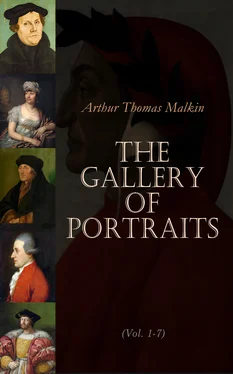The malignity of party spirit was not satisfied by the dismissal of Lord Somers from his office, and from all participation in the government. Soon after his retirement, namely in the year 1701, the celebrated Partition Treaties gave occasion to much angry debate in both Houses of Parliament. His conduct, with respect to these treaties, seems to have been entirely irreproachable; but it became the subject of much misrepresentation, and the most unreserved invective and abuse in the House of Commons. It appears that in 1698, when the King was in Holland, a proposal was made to him by the French Government for arranging the partition of some of the territories belonging to the crown of Spain upon the expected death of Charles II. This partition was to be made in certain defined proportions between the Electoral Prince of Bavaria, the Dauphin of France, and the Archduke Charles, the second son of the Emperor. The King entertained these proposals favourably, and wrote to Lord Somers, who was at that time Lord Chancellor, desiring his opinion upon them, and commanding him to forward to him a commission in blank under the great seal, appointing persons to treat with the Commissioners of the French Government. Lord Somers, after communicating with Lord Orford, the Duke of Shrewsbury, and Mr. Mountague, as he had been authorized to do, transmitted to the King their joint opinions, which suggested several objections to the proposed treaty, together with the required commission. This was the “head and front of his offending” in this respect; for the treaty was afterwards negotiated abroad, and finally signed without any further communication with Lord Somers.
Understanding that he was accused in the House of Commons of having advised and promoted the Partition Treaties, Lord Somers requested to be heard in that House in his defence. His request being granted, he stated to the House, in a calm and dignified manner, the history of his conduct respecting the treaties, and contended, with much force and eloquence, that in the whole course of that transaction he had correctly and honestly discharged his duty both as Chancellor and as a Privy Councillor. After he had withdrawn, a warm debate ensued, which terminated in a resolution, carried by a small majority, “that John, Lord Somers, by advising his Majesty to conclude the Treaty of Partition, was guilty of a high crime and misdemeanour.” Similar resolutions were passed against the Earl of Orford and Lord Halifax, and all of them were impeached at the bar of the House of Lords. The articles of impeachment against Lord Somers principally charged him with having affixed the great seal to the blank commission sent to the King in Holland, and afterwards to the treaties; with having encouraged and promoted the piracies of Captain Kidd; and with having received grants from the Crown for his own personal emolument. To each of these articles Lord Somers answered promptly and fully; to the two first he replied the facts of each case as above related; and in answer to the third, he admitted that the King had been pleased to make certain grants to him, but denied that they had been made in consequence of any solicitation on his part. After many frivolous delays and repeated disputes between the two Houses, a day was fixed for the trial of the impeachment; on which day the Commons not appearing to prosecute their articles, the Lords, by a considerable majority, acquitted Lord Somers of the charges and dismissed the impeachment.
The violence and folly exhibited in the conduct of these proceedings opened the eyes of the King to his error in having changed his ministry at so critical a time. He found to his infinite disquietude that instead of enabling him to manage the Commons as they had promised, the Tory leaders had rendered them more intractable and imperious than before; and that instead of sincerely endeavouring to promote peace abroad and quiet government at home, they were actuated entirely by motives of private passion and revenge. In this state of affairs he again directed his attention to Lord Somers, in consequence, probably, of the urgent advice of Lord Sunderland, and wrote him a note from Loo, dated the 10th of October, 1701, assuring him of the continuance of his friendship. By the united exertions of Somers and Sunderland a negotiation was entered into with a view to the formation of a Whig ministry; but after some little progress had been made, the death of the King, in March 1702, put an end to the project, and the succession of Queen Anne confirmed the establishment of the Tory administration.
The state of parties for some years after the accession of Queen Anne excluded Somers from taking any active part in political affairs. It is probable that at this period of his life he devoted his attention to literature and science, as in 1702 he was elected President of the Royal Society. He afterwards applied himself with diligence to the removal of several gross defects in the practice of the Courts of Chancery and Common Law. In 1706 he introduced into the House of Lords an extensive and effectual bill for the correction of such abuses. In passing through the House of Commons “it was found,” says Burnet, “that the interest of under-officers, clerks, and attorneys, whose gains were to be lessened by this bill, was more considered than the interest of the nation itself. Several clauses, how beneficial soever to the subject, which touched on their profit, were left out by the Commons.” Still the Act “for the Amendment of the Law and the better advancement of Justice,” as it now stands amongst the statutes of the realm, effected a very important improvement in the administration of justice.
Lord Somers is said to have had a chief hand in projecting the scheme of the Union with Scotland; and in discussing and arranging the details of this great measure in the House of Lords, he appears to have been one of the most frequent and distinguished speakers, though he was then labouring under great bodily infirmity.
In the year 1708, on occasion of the temporary return of the Whigs to power, Lord Somers again formed part of the administration and filled the office of President of the Council. But the powers of his mind were at this time much enfeebled by continual ill-health; and it was probably with feelings of satisfaction that the change of parties in 1710, by causing his dismissal from office, enabled him finally to retire into private life.
Of the mode in which the remaining period of his life was spent after his removal from public business, little is known. There is, however, no doubt that the concluding years of his existence were darkened by much sickness and some degree of mental alienation on the accession of George I. he formally took his seat at the Council-Board; but a paralytic affection, which had destroyed his bodily health, had so impaired the faculties of his mind as to incapacitate him entirely for business. At intervals, however, when the pressure of disease was suspended, he appears to have recurred with strong interest to passing events in which the welfare of his country was involved. When the Septennial Bill was in progress, Lord Townshend called upon him: Lord Somers embraced him, congratulated him on the progress of the bill, and declared that “he thought it would be the greatest support possible to the liberty of the country.” On a subsequent occasion, when informed by the same nobleman of the determination of George I. to adopt the advice of his ministry, by executing the full rigour of the law against Lord Derwentwater, and the other unfortunate persons concerned in the Rebellion of 1715, he is said to have asked with great emotion, and shedding many tears, “whether they meant to revive the proscriptions of Marius and Sylla?”
He soon afterwards sunk into a state of total imbecility, from which, on the 26th of April, 1716, he was happily released by death.
Читать дальше












